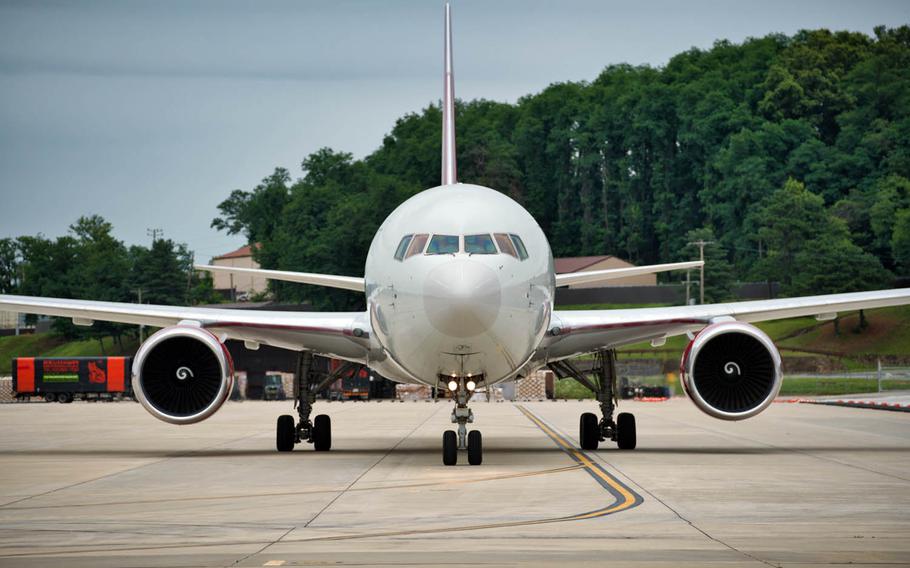
A Patriot Express flight carrying U.S. service members and their families arrives at Osan Air Base, South Korea, July 14, 2020. (Matthew Keeler/Stars and Stripes)
Stars and Stripes is making stories on the coronavirus pandemic available free of charge. See other free reports here. Sign up for our daily coronavirus newsletter here. Please support our journalism with a subscription.
Passengers boarding Patriot Express flights departing from Seattle-Tacoma and Baltimore-Washington international airports will be subject to random testing for the coronavirus beginning Oct. 30.
The rapid, onsite tests are intended to abate the spread of COVID-19, the disease caused by the virus, according to an advisory issued Friday by the Air Force Installation and Mission Support Center.
Anyone testing positive will not be allowed to take the flight, the advisory said.
The United States has had more than 8 million confirmed coronavirus infections since the pandemic began this spring, with more than 221,000 deaths. With tens of thousands of new cases reported in the U.S. each day, the nation is by some metrics the hardest hit in the world.
Many new infections reported by U.S. military installations in Japan and South Korea have come from newly arrived personnel from the United States.
Patriot Express — also called the Rotator or Cat B — is the Defense Department’s contracted commercial charter flight system used by service members and their families for official international travel. Unfilled seats are provided on a standby basis to certain qualifying veterans, retirees and federal employees under what is called space-available travel. Restrictions placed on space-available seats were instituted in March due to the virus and remain in place.
“The Department of Defense is aggressively working to keep passengers safe and help mitigate the spread of COVID-19 on Patriot Express flights by developing a plan for rapid, on-site testing,” Capt. Nicole Ferrara, a spokesperson for the Air Mobility Command, said in a written statement to Stars and Stripes.
Air Mobility Command has oversight of the charter system.
“On-site testing will give the traveler, the DoD and others increased confidence that passengers meet all requirements for safe travel into and out of allied countries,” Ferrara said. “The purchase of test equipment is underway, and testing at departure airports in the continental U.S. is scheduled to begin in a phased manner starting next month.”
Passengers should be prepared to check in earlier because of the onsite testing, she said.
A Defense Department study released last week found that passengers wearing face masks had a very low chance of becoming infected with the coronavirus through the air while aboard crowded commercial airliners.
Tests conducted using mask-wearing mannequins “breathing” out simulated virus particles found that 99.99% of those particles were scrubbed from the cabin within six minutes of release.
The study, however, did not explore risks to passengers from larger droplets, the kind that can be spread while eating without masks, for example. The study also did not consider risks of exposure while passengers are in terminals and boarding channels.
The Air Force is in the process of implementing a servicewide “sentinel surveillance strategy” with the goal of randomly testing Air and Space Force active-duty and civilian personnel to identify pockets of the coronavirus before it has the chance to spread.
Air Force Materiel Command began a phased roll-out of testing Oct. 1 beginning with Edwards Air Force Base, Calif.; Eglin Air Force Base, Fla.; Hanscom Air Force Base, Mass.; and Hill Air Force Base, Utah. The testing is voluntary.
olson.wyatt@stripes.com Twitter: @WyattWOlson